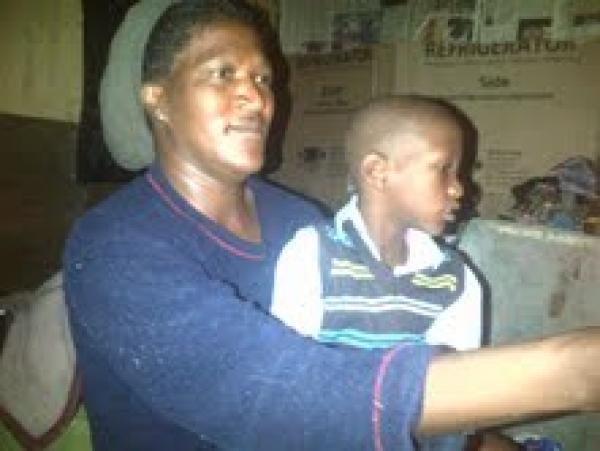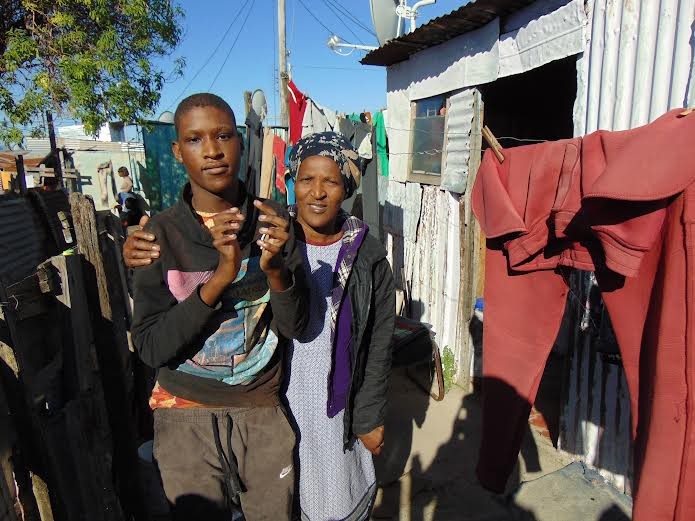Ten years after GroundUp revealed her plight, a disabled woman and her autistic son are still living in a tiny shack with no electricity or sanitation
Musa Pani is now 17 and nothing has changed for the better
Seventeen-year-old Musa Pani and his mother, Leticia Mbuka, outside their Khayelitsha shack. Photo: Masixole Feni
- Leticia Mbuka, who is disabled, and her autistic son Musa Pani live with four other members of the family in a tiny shack in Khayelitsha, Cape Town.
- There is no water or electricity and only a porta potty for sanitation.
- GroundUp first visited the family in 2013.
- Ten years later, nothing has changed for the better in their situation.
- Mbuka says she feels her son has been failed by the authorities.
In 2013 GroundUp visited Leticia Mbuka and her autistic son Musa Pani in their tiny shack in Khayelitsha. Musa was then seven years old and his mother resorted to tying him to a couch when she went out, so as to prevent him wandering off. Ten years later, the family is still living in the shack, with no water supply, sanitation or electricity.
After GroundUp’s first story (in which we did not use real names), a gate was donated to the household so that Musa could be safe indoors. But his mother said the gate was stolen a week later and she had to go back to tying him up.
Mbuka, 52, says she registered on the housing list in 2011. She cannot understand why, 12 years later, she still has no house and she blames “bureaucracy, empty promises and heartless officials”.
Mbuka herself is disabled after a stroke damaged the left side of her body. Musa was diagnosed with Autistic Spectrum Disorder when he was two years old. He cannot speak and has to wear nappies. His mother said she had tried her best to make life easier for him but “the journey hasn’t been easy”.
The family of six cook, wash, sleep and live in the two-room shack in RR section in Khayelitsha. Musa, who is in diapers, uses a porta potty and the others use the communal toilet nearby. The shack floods when it rains. RR Section is one of the poorest parts of Khayelitsha, if not Cape Town.
“There is no privacy,” Mbuka told GroundUp during a visit last weekend.
When he was younger, Musa was tied to a couch when the family were out, to prevent him wandering off or hurting himself or those around him. Ten years, later he is calmer and more aware of his surroundings, but someone has to look after him all the time, as he is unpredictable, says Mbuka.
Musa, his mother and his father, Thozama Mbuka, 61, each receive R2,080 a month from the South African Social Security Agency (SASSA).
Mbuka’s dream is to have a secure house suitable for Musa’s condition, where he can have a room to play around.
“If he could be enrolled at a better-equipped school it would be a bonus.” At present he attends Imizamo Yethu, a school for children with special needs in Khayelitsha, but Mbuka says he is not learning much.
She says politicians made promises before the elections in 2011 that the family would be prioritised and benefit from the next housing project. “I had thought the family’s troubles would disappear and Musa would grow in a suitable environment,” she said.
She said every time she heard of a new housing project, such as the projects in Makhaza or Mandela Park, she was optimistic she would benefit but then “my heart sank”. “I was thinking, as I was made to believe by the politicians, that being elderly and disabled was a prime candidate for a new home,” said Mbuka.
She said she had tried to tell her story to councillors, social workers, the City of Cape Town, the Western Cape government and counsellors at Musa’s school. She feels Musa has been failed by the authorities.
“I have gone to every relevant department possible but I am not getting help. Each of the departments tell me it’s not their mandate and the next says the same thing. Where we are living is not suitable for Musa and myself because we are disabled. It is worse for Musa. He cannot be expected to live a normal life here,” said Mbuka.

Leticia Mbuka with Musa in 2013. Nothing has changed for the better in their situation. Archive photo: Mary-Jane Matsolo
Mkhuseli Matayika, representative of #UniteBehind, an organisation advocating for human rights in Khayelitsha and other townships, said he had visited the family after Mbuka came to them for help.
“No-one in Musa’s condition should be living in this environment. It is saddening but we have community leaders in this area who see nothing wrong all these years, and that must be frustrating for the family. The mother has been sent from pillar to post. How long must the family wait before they are provided a suitable home? The mother is disabled, Musa is autistic and there are six people living in that tiny shack. This is wrong,” said Matayika.
GroundUp contacted Monique Mortlock-Malgas, spokesperson for department of social development MEC Sharna Fernandez, on Monday. On Tuesday she told GroundUp social workers had visited Musa’s family that day to assess his situation.
Mortlock-Malgas said the department would make contact with an organisation specialising in autism support services to assist the family, and social workers from the department would look into the case.
She said in cases like this the department could provide psychosocial support services or refer the family to an organisation supported by the department which offered support services to people with autism.
The department had allocated R61-million for the 2023/24 financial year to 62 social service organisations that provide support to people and children with disabilities, and their families, she said. A further R30-million was spent on funding four Child and Youth Care Centres for children with profound disabilities.
A spokesperson for the City of Cape Town said the City was investigating Mbuka’s status on the housing list.
“In general, beneficiaries of all City housing projects are allocated in accordance with our allocation policy and the date of registration on our Housing Needs Register. This is to ensure that housing opportunities are provided to qualifying applicants in a fair, transparent and equal manner, and to prevent queue jumping,” said the spokesperson.
Autism Western Cape operations manager Zaida Frank said the organisation would make contact with the family and “have in depth discussions with them regarding their needs and see how we can assist within the organisation’s scope of practice”.
“Musa Pani’s family is one of many families with the challenge of accessible housing, access to schooling and medical care,” she said.
Support independent journalism
Donate using Payfast

Don't miss out on the latest news
We respect your privacy, and promise we won't spam you.
Next: Law firm’s directors suspended after R25-million went missing from trust fund
Previous: SAMWU march in Tshwane marred by violence over “internal problems”
© 2023 GroundUp. This article is licensed under a Creative Commons Attribution-NoDerivatives 4.0 International License.
You may republish this article, so long as you credit the authors and GroundUp, and do not change the text. Please include a link back to the original article.
We put an invisible pixel in the article so that we can count traffic to republishers. All analytics tools are solely on our servers. We do not give our logs to any third party. Logs are deleted after two weeks. We do not use any IP address identifying information except to count regional traffic. We are solely interested in counting hits, not tracking users. If you republish, please do not delete the invisible pixel.

